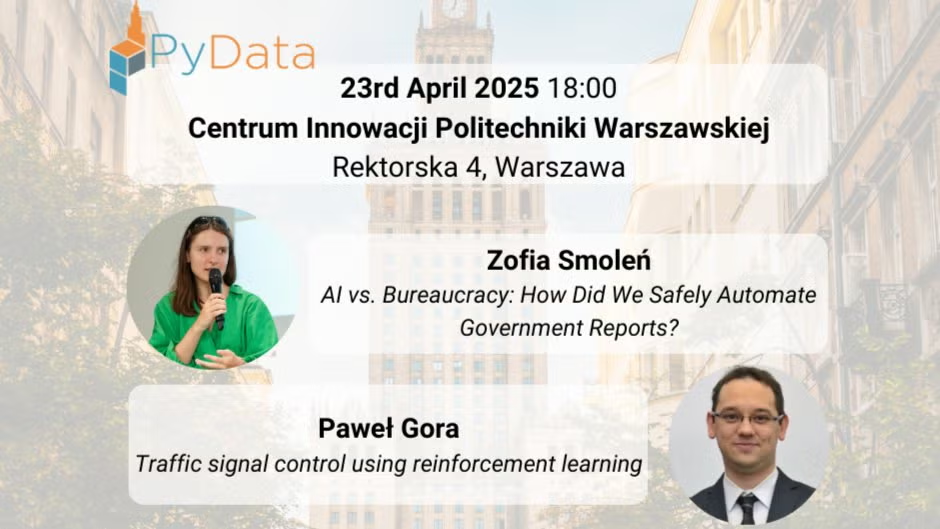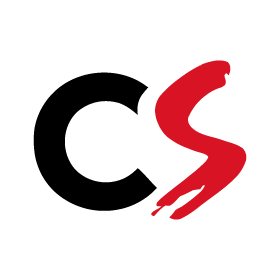PyData Warsaw #28

18:00 - Zofia Smoleń, Asseco Poland - "AI vs. Bureaucracy: How Did We Safely Automate Government Reports?"
About topic: Entrepreneurs are constantly burdened with filling out tedious government reports. At Asseco, we’ve developed a tool that eases this paperwork overload by using Retrieval-Augmented Generation (RAG).
Of course, no one will submit a report without first verifying the AI-generated content. I’ll explain how we’ve made the verification process easier, so users don’t have to redo all the work themselves.
I’ll introduce two proprietary explainability indicators we use (answer completeness and answer certainty) which help guide users to the sections that need closer review.
Finally, I’ll explore alternative explainability strategies, including red teaming, LLM voting, human-in-the-loop, and other verification techniques.
About speaker: Zofia Smoleń is an AI expert specializing in the application of Large Language Models (LLMs) in the financial, legal, and healthcare sectors. At Asseco Poland, she is currently developing AI-powered applications that simplify regulatory reporting.
As the CTO of MindMatch.pl, a platform connecting patients with psychotherapists, she designed and implemented an LLM-based chatbot that diagnoses symptoms and recommends the most suitable specialists. Her experience also includes working as an IT consultant at Boston Consulting Group, where she advised financial institutions on AI implementation and digital transformation.
She holds a dual degree in Data Science for Business from HEC Paris and École Polytechnique and has received several prestigious awards, including the Palantir Women in Technology Scholarship, France Excellence Europa, and Top 100 Women in Data Science in Poland.
Zofia has spoken at major conferences such as Code Europe, Infoshare, and HealthTech for Patients, where she shares her insights on AI model explainability and the use of AI in regulated industries.
18:45 - Paweł Gora, TensorCell/Fundacja Quantum AI - "Traffic signal control using reinforcement learning"
About topic: In this talk, I will present recent results from the TensorCell research group on reinforcement learning for traffic signal control. Independent agents controlling traffic at different intersections are trained using the IDQN and IPPO algorithms to make the traffic flow as efficient as possible. Experiments on realistic Melaka traffic scenarios simulated in the SUMO traffic simulator and using the RESCO framework yielded very good results, outperforming not only centralized control by single agents trained with DQN and PPO algorithms, but also the Webster algorithm, which is widely used in practical traffic engineering applications.
About speaker: Dr Paweł Gora – Scientist, IT specialist, philantropist and entrepreneur working mainly on the applications of AI (especially in transportation and medicine) and quantum computing. Graduated from the Faculty of Mathematics, Informatics and Mechanics of the University of Warsaw (M.Sc. in Mathematics, M.Sc. in Computer Science, and Ph.D. in Computer Science).
He is the founder and CEO of the “Quantum AI Foundation” http://www.qaif.org, which aims to support education and research in new technologies (especially AI and quantum computing) by organizing meetups (e.g., Warsaw.AI and Warsaw Quantum Computing Group), workshops on quantum computing, conferences, competitions and hackathons, as well as publishing newsletters (Warsaw.AI News and QPoland Newsletter) and moderating social media groups and profiles related to AI and quantum computing and ITS. He is also the Chairperson of the Board of QWorld and Coordinator of one of its local QCousins, QPoland. He also collaborates with several startups serving as a technical and business advisor.
He has more than 15 years of experience in the field of Intelligent Transportation Systems (ITS). He has worked on projects related to modeling and simulation of transport networks, traffic management systems, carpooling/vanpooling services, bike-sharing services, electric vehicles, connected and autonomous vehicles, intelligent parking systems, optimization of logistics. He built a microscopic traffic simulation software, Traffic Simulation Framework, and used it for experiments with AI (graph neural networks, reinforcement learning) to optimize traffic signal settings in the TensorCell research group, which he founded in 2017 and which aims to optimize complex processes using AI.
He has received several awards, e.g., “Lider ITS” award for the best R&D work in the ITS domain in Poland. “MIT Technology Review” recognized him as one of 10 Top Polish Talents in the “MIT Innovators Under 35” competition. In 2017, he was also placed on the list “NEW EUROPE 100” of emerging technology stars in Eastern Europe.
In the past, he worked as a software engineering intern or research intern at Microsoft, Google, CERN and IBM Research, was also a representative of Poland in the Management Committee of the COST Action “Wider Impacts and Scenario Evaluation of Autonomous and Connected Transport”, and a member of the Council for Digitalization.
Venue:
Centrum Innowacji Politechniki Warszawskiej, ul. Rektorska 4
Room 3.12 (3rd Floor)






